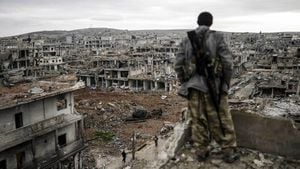Mali's military regime has carried out significant drone strikes against Tuareg rebels, resulting in the deaths of eight rebel leaders. This incident has marked the first time since the Tuareg rebellion began back in 2012, indicating the government's escalation of military operations against rebel forces.
Reporting from Bamako, the conflict has seen increased activity, particularly around the town of Tinzaouatine, situated near the border with Algeria. According to Mohamed Elmaouloud Ramadane, a spokesman for the rebels, these synchronized drone attacks took place on December 1, 2024. The decision to target the Tuareg leaders has drawn attention not only for its scale but also for the timing, coming just after armed groups announced the formation of the Azawad Liberation Front, which aims for total liberation of the northern region of Mali known as Azawad.
Among the deceased is Fahad Ag Al Mahmoud, recognized as the Secretary-General of Gatia, one of the factions within the Tuareg coalition. The Malian military confirmed these strikes were orchestrated as part of what they described as special operations against terrorists. The General Staff broadcast the news, affirming their commitment to dealing firmly with the rebels.
Analysts note the importance of these developments. Rida Lyammouri, affiliated with the Policy Center for the New South, indicated, "This is clearly a significant blow to northern Malian groups, especially since the victims included key figures influential within their communities." He emphasized, though, the possibility of heightened anti-Bamako sentiments among the Tuareg populations following these incidents.
The resurgence of violence adds another layer to the complex dynamics in Mali, where various political groups and militias—often fragmented—compete for power. Sociopolitical tensions remain high as the military regime continues to assert its authority through force against groups seeking autonomy or independence.
Set against the backdrop of long-standing grievances about governance and marginalization, the attack on Tinzaouatine follows the broader patterns of conflict across the Sahel region, where insurgent groups have gained control over significant territories. Recent Merger of Tuareg groups to form the Azawad Liberation Front showcases the desperate need among these factions to unify against what they perceive as oppressive government forces.
Despite the Malian government's attempts to assert dominance over the region through military action, experts warn against jumping to the conclusion of victory over the insurgents. Such military operations, particularly drone strikes, can often lead to unintended repercussions, including bolstering opposition movements. The backlash against Bamako may only intensify as rebel groups reorganize and regroup from their losses, seeking to reassert their influence and territorial claims.
The consequences of this incident extend beyond mere military statistics; they resonate deeply within the very communities affected by this violence. Local populations caught between government forces and rebel factions often suffer the most, embroiled in the chaos of power struggles.
On the ground, residents express confusion, fear, and frustration. For many, the perception of safety remains tenuous, exacerbated by the latest airstrikes. Civilians, often collateral damage, may find their loyalties tested amid shifting allegiances and promises made by competing entities.
With regional and international observers closely watching the situation, Mali's continuing conflict reveals the complex interplay of local autonomy aspirations and central government authority. Whatever the aim—whether freedom from perceived tyranny or simple security against violence—the reality on the ground for many remains grim.
Moving forward, Mali's future hinges on the government's ability to respond not only with military might but with effective governance and inclusive dialogue. Addressing the root causes behind the rebellion may prove to be the ultimate test for the military regime as it maneuvers through this pivotal moment in the nation’s history.



